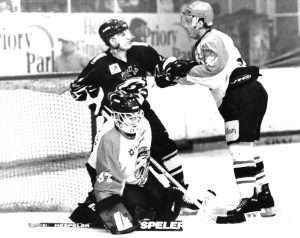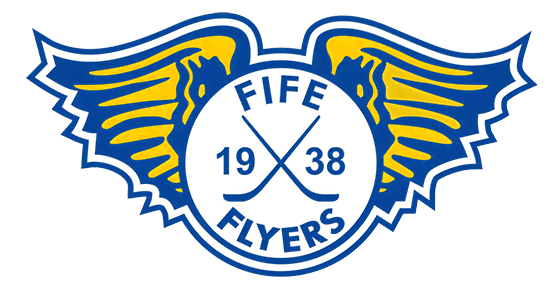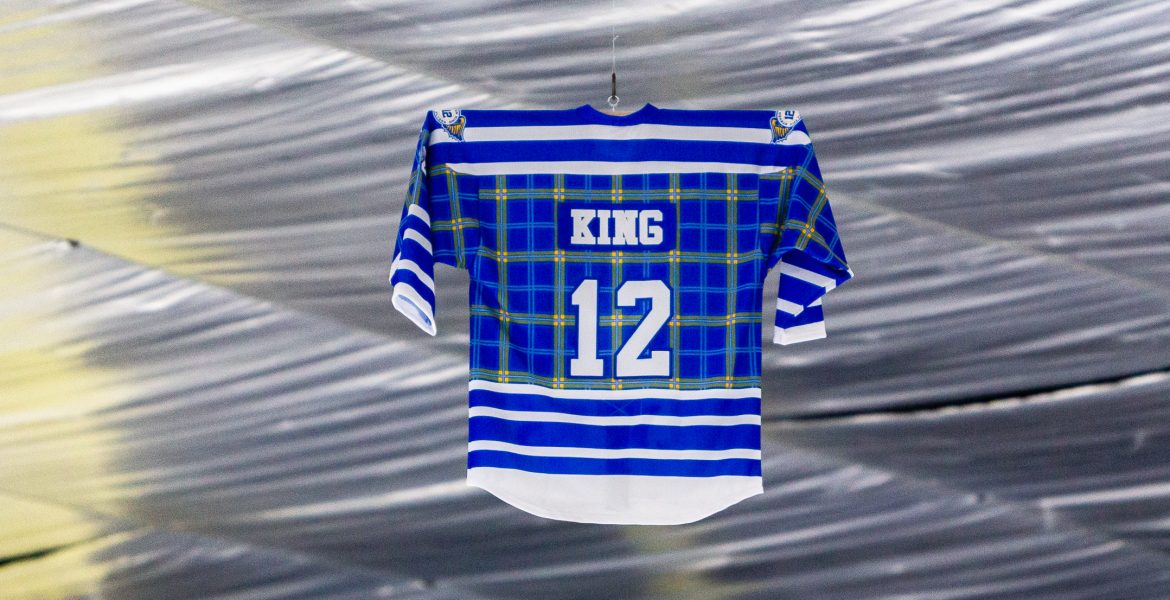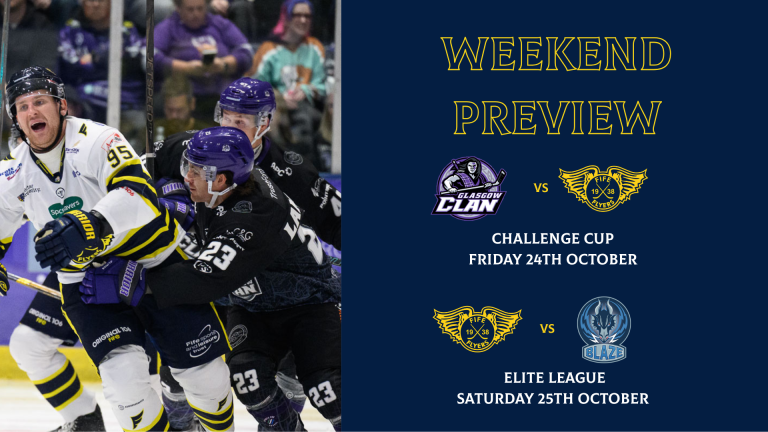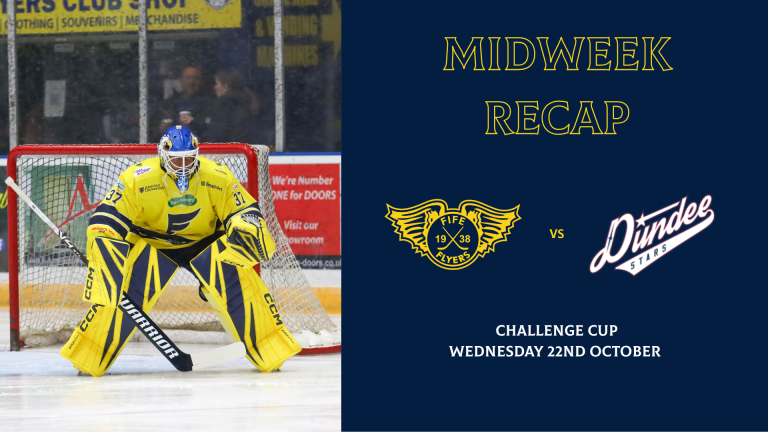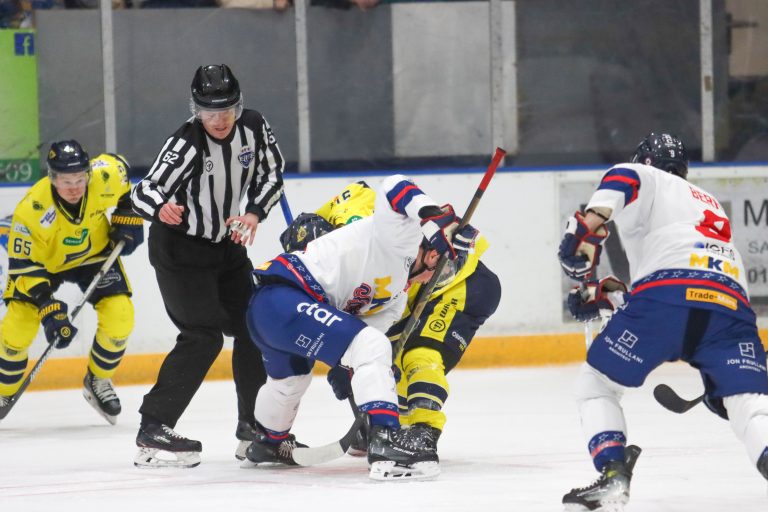Steven King, or ‘Kingy’ to many was born in Kirkcaldy and played through many successful seasons with the Kirkcaldy Ice Hockey Club’s junior development programme.
He made his senior hockey debut in December 1989 at 14 years of age, the second youngest player ever to play for the Flyers. He switched to his now synonymous number 12 jersey in 1991/92 when he scored his first Flyers goal against the Durham Wasps and went on to help the Flyers regain their place in the Heineken Premiership league that season.
In season 1993/94 he was the Flyers top British scorer with 94 points and scored his first senior hat trick as he played on a line with Mark Morrison and Doug Smail. Steven gained Great Britain recognition but often missed out on furthering his International prospects due to work commitments.
Steven’s goals and assists production continued through the 1990’s and he was made an assistant captain in season 1995/96. In season 1996/97 he recorded a 10 point game with 5 goals and 5 assists and the decade ended with back to back British Playoff Championship trophy wins the second of which saw Steven playing with a double broken jaw as he also helped the club secure a Grand Slam.
In December 2002 his second assist of the night against Dundee saw Steven score his 1000th point for the club. Season 2009/10 saw him achieve another couple of personal milestones as he became the only Flyers player so far to play 1000 games in a match against the Dundee Tigers in November and in March he registered has 1000th assist against the Charlestown Chiefs and also the only Flyers player to breakthrough that four figure threshold.
A one club player Steven has the second longest longevity streak of 23 seasons as a Flyer and he recorded 1553 points from his 1034 games which are both all-time leading numbers that may very well never be broken.
The following is an extract from the commemorative programme celebrating his achievement which is available from the rink or the Flyers online shop.
For Steven, as a 15 year old, he made 7 regular season and 4 relegation playoff appearances in the Flyers ill-fated 1990/91 season whilst still playing for the Flames. He was also named as Great Britain Under-16 captain for that season. Steven would lead the Flames to their first Wembley win, in their fifth attempt, as they blanked Romford 5-0. Steven opened the scoring in the first period with a shorthanded strike before adding the Flames third in the second period to finish the game with 2+1. With the League already secured Steven would help the Flames lift the treble with a Scottish Cup win after their London heroics as he once again topped the scoring charts.
Having jumped straight from the Flames to the Flyers whilst also now playing for the Kirkcaldy Kestrels he switched from number 15 to his familiar number 12 for the start of the 1991/92 as the Flyers prepared for life in unfamiliar surroundings of the British League One.
His first senior points came in the Autumn Cup when on Saturday August 31st at Kirkcaldy he scored his first goal in an 11-5 win against the Durham Wasps, the Flyers blowing away the ‘Big Blue Machine’, who were reigning British Grand Slam Champions.
Here’s how the match was reported in the Fife Free Press:
The myth of three line hockey became a reality on Saturday when Fife Flyers crushed Grand Slam champions Durham Wasps. The policy talked about by every coach at every rink was put into practice by Brain Kanewischer, and it worked to perfection. Flyers dictated the game, and finished with a strength and style which was so glaringly absent last term. The coach iced his entire bench within seven minutes of the face-off, and all three lines contributed to what could only be described as a demolition job of one of the most powerful teams in the country. They exhausted Durham’s talented but limited personnel and crowned a memorable night with a quite unbelievable 6-1 final period. The goals came from no fewer than seven players, with three others notching assists, but the biggest plus factor in a superb all-round display was the rock-solid performance of stand-in netminder Colin Downie. Flyers got off to a brisk start, and called the shots with a series of slick line changes which gradually sapped the energy from Wasps’ established skaters. Kanewischer matched his third line with Durham’s first, and they came up with the opening goal after seven minutes of play; Craig Wilson and Chris Whitehill worked down the flank, and Steven King dropped the puck behind Frankie Killen. Wasps’ hardest working player, Mike O’Connor made it 1-1 with a thundering power play strike at 11:05, and he then set up number two for Rick Brebant against Flyers’ third line. That, however, was the last time Durham were in front all evening. Downie defied Mike Blaisdell in the first of several head to head encounters— he pulled off a fine diving save — and Flyers drew level just 70 seconds before the first buzzer. Frank Morris collected a loose puck in the neutral ice, and he beat Killen with a textbook finish. Their confidence increased with every shift in a closely contested second period, and the highly productive second unit claimed the opening goal at 23:13. Les Millie danced around Robert Wilkinson, and although Bobby Haig failed to find the net, he managed to scramble the puck back to brother John who beat Killen from close range. O’Connor struck metal work with a vicious shot as Durham continued to rely heavily on their first line, and Ian Cooper hauled them back to level pegging at 28:50 .. for all of 24 seconds; Flyers’ instant reply coming from Frank Morris. Blaisdell finally beat Downie on the half hour mark, but his evening of misfortune continued when Morris calmly scooped the puck off the line. Damien Smith levelled at 4-4 with less than four minutes to play, but Flyers struck again through Robertson to take a 5-4 advantage into the second break. Les Millie made it 6-4 at 41:57, and Killen gifted John Haig number seven when he dropped the winger’s angled shot just one minute later. A short-handed Blaisdell counter temporarily halted Flyers’ progress at 51:55, but it was swiftly cancelled out by Robertson’s power play as Rick Brebant twiddled his thumbs in the sin bin. With seven minutes left, Cal Brown drifted into the zone, flicked the puck off Killen’s pads and netted his own rebound — and that was the big defenceman’s last slice of action. With the puck killed, Blaisdell took his frustrations out on Brown, and cross-checked him into the boards. Flyers import was eventually stretchered into the dressing room and Blaisdell was dismissed on a game misconduct penalty. His departure opened up the ice to Laplante who boosted his own statistical returns with two late power plays.
The following night in Edinburgh he picked up an assist as the Racers edged the Flyers 9-8. His first Heineken league goal was scored on 19th October against Romford Raiders and it turned out to be the game winner in a 9-2 Flyers victory. He finished that season with the Flyers having regained their Premier Division status and across all competitive games he scored 34 points from 30 games. For the Kestrels he was second in points with 29 in his 16 games played.
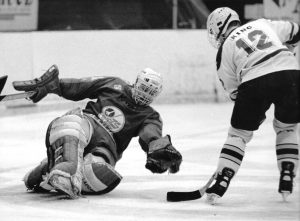
Steven along with three other Kirkcaldy players were drafted into the GB under-19 team which travelled to France for the European Championships in March in what was Britain’s unsuccessful bid to gain promotion from a very tough Pool ‘B’ which featured opposition from Austria, France and Italy. Flyers’ contingent of players was second in strength only to Durham who provide no fewer than seven players. Steven was selected again the following season and over the course of his 12 games scored 6 goals along with 5 assists.
Season 1992/93 saw the King brothers meet in opposition as the Flyers returned to the Premier League to renew hostilities against the Cardiff Devils for whom Derek had joined 18 months earlier. The first meeting of the siblings was on 17th October and Steven was left smiling as the much fancied Devils were sent packing. A 5-1 Flyers win, their first ever win against the Welsh side and it was Derek’s mistake that allowed Iain Robertson in to score the opening goal assisted by Steven. McEwan levelled before Flyers got to grips with what was a tousy affair and iced the win with a Frank Morris double, Robertson again and Bob Giffin completing the scoring. Two weekends later however and Derek had gained ample revenge with a 12-1 shellacking in the Welsh Capital with Morris the scorer. Despite scoring in the next meeting in February in Cardiff Steven was again on the losing side as the Devils won 9-5 and Steven didn’t ice in the fourth and final meeting when the Devils again won, 7-2, on the way to winning the Grand Slam. It was a productive first full season in senior hockey for Steven who finished third in team scoring with 23+40 and picked up a Heineken Young Player of the month award which saw him presented with the iconic ‘stetson’.
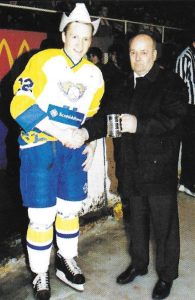
So to season 1993/94 and the King brothers were reunited in the White, Gold and Blue and would remain playing on the same team for the next 18 seasons. Derek returned to be one of the assistant Captains in Jim Lynch’s team with one other addition being new recruit Mark Morrison. Steven ended that season as the Flyers top British points scorer in the league with 36+58 from his 59 games played, only behind Morrison, Doug Smail and Ryan Kummu. It didn’t hurt to have the aforementioned as regular line mates. On 9th January Steven recorded his first senior hattrick as well as picking up 4 assists in a 15-3 humbling of the Durham Wasps in Kirkcaldy. He would hit further trebles in back to back home games in March and along with Iain Roberston would be selected for games for the GB ‘B’ team in Spain in December as both youngsters tried to impress GB coach Alex Dampier enough to make the senior squad. Steven collected another ‘stetson’ and tankard for Young Player of the Month again in December in a competition publicised through the Ice Hockey News Review and sponsored by the Government of Alberta who offered a two week trip to the Calgary Flames training camp to whomever was selected as Young British Player of the Year. Whitley Warriors David Longstaff would win that opportunity at the end of the end of the season.
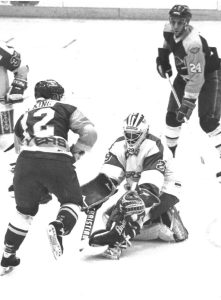
The Flyers finished a distant second to the Cardiff in the league, picked up the Scottish Cup and made it all the way back to the Wembley Finals but would run up against the formidable Devils team in the semi-final and were defeated 9-5 as the Welsh side went on to complete the League and Playoff double. The Scottish Cup win was the Flyers first in that domestic competition since the Wembley winning season of 1984/85. The trophy was secured with a dramatic late winner in a 6-5 game against the Murrayfield Racers when an inch perfect Iain Robertson pass found Steven and youngster beat two Racers defencemen to then fire a great shot that went stick side on Moray Hanson. Maybe it was written in the stars as the Flyers due to a strip mix up took to the ice wearing the KIHC recreational hockey jersey’s of the Kings!
Another end of season call up for Steven to the GB ‘B’ team – nicknamed the British Lions as unlike the GB ‘A’ team, which was dominated by dual nationals, this squad comprised British born and trained players. Steven had unfortunately to turn down the opportunity as work commitments took priority. Despite his talent Steven’s decision to balance a hockey career with full-time employment prevented him from achieving the international recognition he deserved. “I played all the way through the Great Britain juniors but I couldn’t make senior camps due to work commitments,” he said. “There were players in the GB team that I’d grown up with and maybe I would have been good enough but I don’t worry about that. I had other priorities. It would have been nice, but I had a job and I couldn’t afford to take any more time off for the hockey. The way I saw it, I had the best of both worlds. I had a job, which was important to me, and I was getting to play hockey. “The hockey won’t always be there, but you always need a job. I know everyone has their own ideas about that, but that’s how I saw it, and it worked out fine for me. I’m quite happy with the choices I made.”
The hopes and aspirations of the Flyers in that 1994/95 season were wrecked by a series of health problems and the fans were left to reflect on what might have been. Sixth place in the league and a second successive Scottish Cup triumph were remarkable achievements considering the enforced absence of so many key players. It all started so promisingly. Mark Morrison and Ryan Kummu returned and Josh Boni arrived with glowing reports. New import forward Tony Szabo also roared out of the starting blocks as Flyers romped into the quarter-finals of the B&H Cup with a 100 per cent. record. By November, Boni had been cut and his replacement, Doug Marsden from Paisley, barely had time settle before the team was shorn of its imports. Kummu shattered his jaw in a Christmas Eve training accident and Morrison was floored by a sciatic nerve. To add to those woes Szabo walked out 24 hours before a trip to Cardiff. In the face of such adversity, however, a new spirit emerged and in particular the club’s young British skaters earned nothing but praise for some gutsy performances while under-strength. The black clouds lifted in January with the triumphant return of legend Doug Smail and as they regrouped the following month Kummu suffered a second broken jaw. Smail then sent an SOS back home and it was answered by his former Winnipeg and Ottawa team-mate and friend, 34 year old Laurie Boschman who made over 1000 NHL appearances. The playoffs began with hopes of a Wembley return but the season ended with a cruel twist with Morrison’s broken thumb in plaster. However for Steven, still a teenager, he scored an incredible 88 points (37G + 51A) in 44 regular season games to finish as runner up in the Flyers points table to Mark Morrison. He totalled 110 points as an ever present in 62 competitive games played for his career best single season points tally.
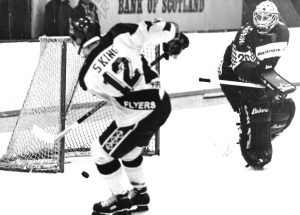
The Flyers emerged for the new 1995/96 season after a summer of unprecedented change on and off the ice. Kirkcaldy ice rink underwent a £500,000 facelift and the team changes were no less dramatic. Jim Lynch stood down as coach, paving the way for the return of a tantalising name from the past -Ron Plumb. The 1985 Coach of the Year spent two weeks battling through red tape before finally walking across the ice to a standing ovation. Sadly, the homecoming was not prolonged. Plumb inherited a ready-made team comprising new signings such as Chris Palmer (Murrayfield), Frank Morris (back for a second spell), Scottish defenceman Paul Hand (Murrayfield) and Mark Slater (Bracknell). But few were fooled by five straight wins in a weak Benson and Hedges Cup section. Quite simply, Flyers were under-performing. Hand, always a controversial signing, quit on the eve of the quarter-final second leg at Whitley. Derek and Steven were both selected as alternate captains, Steven’s first letter in senior hockey as Mark Morrison took over as player-coach as Plumb moved into an off-ice commercial role before returning home in the New Year. Flyers’ true abilities finally shone in the epic televised semi-final clash with Sheffield which went to sudden-death overtime before ending in defeat.
In the league, Flyers’ predominantly British based squad often found it tough going against a plethora of Canadian-Brits, but the club’s belief in genuine local talent was emphasised by the return of defenceman Scott Plews from Telford and forward Les Millie from Sheffield. As 1996 progressed, Morrison stepped up his relentless drive for the playoffs. He benched players and increased competition by bringing in two extra imports, defender Frank Evans and firecracker forward Kevin St Jacques who quickly became a crowd favourite. By early February the team was playing at its hottest, culminating in a 6-5 win which shattered Cardiff’s title hopes. They finished the season as the form team with seven wins in eight games, raising hopes of a place at Wembley. The playoffs began badly however with a 5-4 reverse in Nottingham, a start from which Fife never recovered. Beaten but by no means disgraced, Flyers at least flew the flag for British hockey, and their fans added their voice on many nights. Steven had another ever present season and was third in team points with 77 across his 54 games behind Palmer and Morrison.
BRITISH NATIONAL LEAGUE
Flyers dominated the NPIHL in season 1996/97 and were run away winners under the captaincy of Derek and Steven’s points production was once again outstanding with 98 points (37G + 61A) in just 35 games. It was a year of unprecedented change and incredible success. Fife Flyers stepped back two decades to join the fledgling Northern Premier League, under the banner of a new management and with a new-look squad. The last British League side to skate in Kirkcaldy was all but dismantled as a core of senior players went to Paisley, John (Bernie) McCrone left, and imports Chris Palmer, Frank Evans and Kevin St. Jacques did not return. But Mark Morrison did as the player-coach, and became a central figure in Fife Flyers Limited, the company created by three local businessmen, Tom Muir, Jack Wishart and John Waring, to run the famous team. Taking control, Mr Muir observed: “There are too many people in Kirkcaldy who love ice hockey for there not to be a team.” He was right as the old rink regained much of its unique match-night atmosphere. Working closely with assistant Chic Cottrell, Morrison steered a rookie side – one developed almost exclusively within the Kirkcaldy district -to an NPL and Scottish League double, breaking countless records enroute. The class of 1996 equalled Ron Plumb’s modern era record of 14 straight wins and remained unbeaten on home ice for five months. There was a genuine feel good factor as crowds rose encouragingly, sponsorship hit an all-time high, and the feel-good factor flooded the oldest and grandest of British arenas. “Our stats are something to be proud of,” said Morrison. “They reflect great credit on the players.” But they also reflected Morrison’s immense commitment to club and town – his rewards were a unique double of player and coach of the year in the hockey writers’ awards. ‘Mo’ brought out the best in rookies such as Kyle Home and Wayne Maxwell with Steven now considered one of the senior players along with Derek, Martin McKay and the evergreen Gordon Latto. Defenceman Russ Parent came on board and showed true leadership throughout the playoffs, while the winter signings of Mark Slater and John Haig added depth. Steven and Haig both had games to remember as they each recorded 5+5 in games against Dumfries and Castlereagh respectively – a best ever single game points total for both. Throughout the season Flyers drove relentlessly towards their goal of the Premier Leagues’ championship finals. They encountered some epic games with Paisley enroute but made it and took over 1,000 fans to Manchester, far more than most Superleague sides mustered. Swindon’s Dream Team may have triumphed, but the memory of that day will remain with the club for some time to come. Steven also picked up a personal accolade at season end as he was voted the Best Home Player.
The first BNL season, 1997/98, Steven was again the Flyers top British point getter with 86 from 37 games but Derek also had a career year with his best ever points haul. 7 goals and 29 assists for 36 points from 40 games was indeed a breakout year for the blueliner. Flyers’ battles with Kingston Hawks were among the highlights of a season in which a hesitant start was long forgotten amid a triumphant finale. The Autumn Trophy was a good indicator of what lay in store. On the opening day, Kingston came to Fife and won 3-2 in the first in a series of epic meetings which culminated in an astonishing 1-0 defeat in Hull. Inevitably, the sides met in the BNL championship semi-finals, with the English side again securing the win. Flyers never did get the upper hand against Hawks’ Finnish netminder Pasi Raitanan. The BNL rekindled regular competition against the import-dominated English sides and Flyers’ home-grown talent relished the challenge. An October defeat at the hands of a workmanlike Peterborough Pirates prompted a dressing-room reshuffle. Out went summer signing lain Simpson and John Reid, both to Paisley, while Richard Dingwall stopped playing. In came Richard Charles followed later by his Lancashire team-mate Lee Cowmeadow. After that, Flyers never looked back. They beat everyone in the BNL, including a stunning 7-6 win to destroy Guildford’s 100 per cent record with Steven getting an early opening goal and put together a superb sequence of wins over arch rivals Paisley. Sixth spot in the BNL was disappointing but inevitable after the early losses – but Flyers more than made amends in a rip-roaring defence of their Northern Premier crown. The league may have slimmed down to five members, but the inclusion of Kingston ensured a thrilling three-horse race to the wire. In the end, Fife went to Paisley and won on their ice for the first time this season. It was Flyers’ first back-to-back league titles for exactly 20 years. They then returned to the Lagoon Centre to reclaim the Scottish Cup – their third triumph in five years.
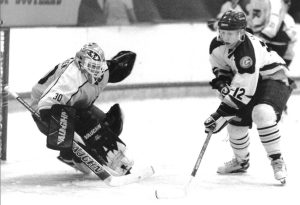
Season 1989/99 saw a playoff final win against the Champion Slough Jets. “British Champions – I like the sound of that.” were the words spoken by Mark Morrison as he reflected on Fife Flyers’ Diamond Jubilee season which ended on the highest possible note. A British Championship crown – their first since Ron Plumb triumphed in 1984-85 – was a fitting reward for Britain’s oldest team. The club was determined to mark its 60th anniversary with silverware. In an import-dominated league they were forced to increase their foreign legion to six – their highest tally for some 50 years – but at heart Flyers remained a home-based hockey club. Granted, they took time to gel. Too many points were lost at home to sustain a title challenge, but they were always a top five team. Netminder Ricky Grubb performed well on his return home from Paisley and former Saskatoon Blade Justin Bekkering was solid on ‘D’, but the biggest summer signing, netminder Frank Neckar, was also the most disappointing. The flamboyant Czech was cut before Christmas and netminding remained a headache. In total Flyers went through five goalies, ending with Telford’s Joe Watkins, 19, the GB under-20 keeper, and Glasgow-born prospect Stephen Murphy, 16. Murphy back-stopped the team to a Scottish Cup win over Edinburgh watched by a capacity 3,000 crowd, the biggest attendance anywhere in Scotland all season with Steven grabbing a double. Flyers enjoyed two purple patches during which they roasted the heavily Canadian dominated southern sides, much to the delight of huge partisan Fife crowds and they kept their best form for the closing two months of the season. That up-turn coincided with the arrival of two more players from Telford – Todd Dutiaume who stepped into the team and looked as if he’d been there all his life and John Coyle who’d quit Tigers after some impressive early season displays. With the missing pieces now slotted in Flyers took off. They overcame the loss of Morrison with a broken ankle on the eve of the playoffs and peaked with perfect timing at Hull where Coyle’s penalty shot capped a truly remarkable final against Slough Jets in a game in which Steven himself scored a highlight solo 4th goal and assisted on three others. Three of the top four points scorers for the Flyers were British with Steven finishing third with 62 points.
If Fife Flyers’ Diamond Jubilee season was memorable, then what followed was magnificent. A British National League playoff victory in March 1999 was the catalyst for one of the most successful season in the club’s long history – four trophies, a handful of all-star honours, and enough highlights to make a movie, never mind a video. Flyers won their first national league title since 1991-92, lifted the Christmas Cup, and then turned that double into a treble with a second consecutive BNL playoff Championship. They also managed to find space in the trophy cabinet for their fifth Scottish Cup. Only the Benson and Hedges Plate eluded their grasp – they were beaten semi-finalists after winning their group in the Cup. Canadian player-coach Mark Morrison and his Scottish assistant Chic Cottrell took 19 diverse individuals and moulded them into a team which played fast, skilful and disciplined hockey. For Morrison the reward was a second Coach of the Year title while his men dominated the post-season honours. Netminder Stephen Murphy cleaned up at every level after a superb rookie season in which the 18-year-old out-performed every goalie in the league. At the other end stood forward Russell Monteith who shattered Fred Perlini’s club record of 26 powerplay goals with his own total of 38. Flyers also got huge seasons out of their key players, Frank Morris and Ted Russell were immense on defence but it was Steven King who best summed up the spirit in the camp by playing through two of the BNL final games with a double broken jaw. Steven topped the British points scoring with 102 and was only behind Monteith and Dutiaume.
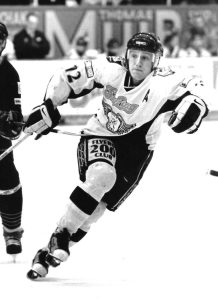
Following a Grand slam season is always going to be a tough ask. For Flyers, season 2000-01 yielded one cup semi-final, one final, third place in the league and the retention of the Scottish Cup. By most standards this was a successful campaign but it inevitably paled when compared with the clean sweep 12 months earlier. It was also a season which could have easily produced more. The scheduling of the NTL Cup final, in particular, was a source of intense frustration. Coach Mark Morrison had to take a depleted bench south for the first leg on a Tuesday night. “Players do the hard work to get us there and then find they can’t play.” he hit out. “That’s not right.” The frustration resurfaced in the playoffs as Fife took five of their seven points on the road but still failed to qualify for the semi-finals. The league crown was effectively lost early on as Flyers struggled to get their road game going. Four points were lost in one October double-header weekend at Slough and Milton Keynes and they eventually lost the league title to Guildford by four points. Those defeats came as Morrison juggled his netminders following the loss through injury of Ricky Grubb. He used Paisley stopper Bill Morrison as cover for the B&H semi-final with Basingstoke, and later drafted in Bill Russell before bringing back ‘wonder-kid’ Stephen Murphy for the later stages of the campaign. David Smith and John Haig left for Guildford but lain Robertson returned to his home-town club after spells with Edinburgh and Paisley. He linked well with Morrison on the second line. Imports Ted Russell and Russell Monteith returned along with Frank Morris for an eighth season. Monteith and Todd Dutiaume topped all the points scoring stats and Morris was as influential as ever on defence where Derek King was singled out for praise by his coach. The Scottish Cup was retained against Edinburgh thanks in part to a hat trick from Steven but in truth it was a poor final. Flyers were also declared Scottish regional winners of the inaugural ‘Best Of British’ competition but it was never completed.
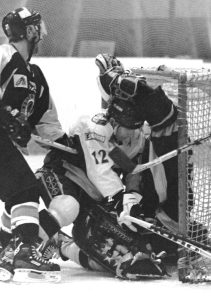
More silverware (ok it was made of glass) followed in season 2001/02 but for Fife Flyers there was the nagging feeling that it could have yielded more. Mark Morrison returned for a ninth consecutive season in Kirkcaldy and bolstered his team with proven hockey players – the evergreen Frank Morris, the razor-sharp Todd Dutiaume and the outstanding Russell Monteith. Three times Grand Slammer, Karry Biette, was added late in the summer and switched to defence, while Dutiaume’s younger brother, Mark, joined his London Knights’ team-mate, Shawn Silver, north of the border. The season started with a capacity crowd and the rebirth of the Fife-Dundee derby which has a pedigree spanning six decades. Fife won 3-2, but Stars were to be their nemesis as the season reached its climax, taking the Caledonia Cup from them, and eliminating them from the semi-finals of the playoffs. Flyers scored one win on Dundee ice – the only team to do so – to dump Stars out of the Findus Challenge Cup, and in November they went to the Cup final and produced their finest hour, crushing Coventry Blaze 6-3. Steven had four helpers in the semifinal win with Derek getting an assist in the final. Morrison won the coaching battle while his on-ice leader, the never-say-die Biette, produced a stunning solo goal to set the Nottingham Ice Centre alight. In the league Fife were always in the top three, but, like everyone else, found Stars’ consistency just too hot to handle. Their four-man defence put in some sterling work with Derek King immense and Morris a model of consistency, while Silver enjoyed a solid season between the pipes. Mark Dutiaume was cut mid-season and went to Sheffield, while blueliner Bob Quinnell was added. Fife remained on course for the playoffs until a knee injury in a nothing league game in Milton Keynes ended Monteith’s season. Playmaker Nick Poole had already signed up for the post-season schedule and after watching him skate many fans were left wondering how well he would have complemented ‘Monty’. In the end the loss of the league’s best centreman was too much for the team to overcome. Steven would end the regular season tied with Todd Dutiaume with the most assists on the team (48) and was once again top British points scorer.
